We’ve all been there, staring at an intricate skill tree in a game, weighing our options, and wondering, Should I invest in stealth or double down on brute force? These moments are what make skill trees so captivating. They’re not just a gameplay mechanic; they’re the beating heart of player choice, progression, and creativity. Whether you’re shaping your hero’s journey with specialized abilities or just experimenting with different builds, a well-designed skill tree transforms your gameplay entirely. In this article, we’re diving into the best games with a skill tree, breaking them down across genres, and exploring how their systems cater to different playstyles. If you’re all about progression, personalization, and replayability, you’re in for a treat. Let’s branch out together!

Best Games with a Skill Tree: What Makes a Great Skill Tree?
Great skill trees are like puzzles mixed with possibilities. They give us the tools to tailor characters, explore unique gameplay styles, and find creative solutions to challenges. But what separates good skill trees from great ones? Let’s look at the key traits:
- Diverse Playstyles: The best skill trees offer more than just stat boosts; they shape the way we approach the game. For example, Assassin’s Creed Valhalla allows stealth-oriented players to stay hidden, while combat-focused builds let us dominate enemies head-on.
- Meaningful Choices: A great skill tree forces us to think. Instead of unlocking every skill, impactful decisions make us weigh pros and cons, ensuring each playthrough feels unique. Games like Path of Exile embrace this complexity.
- Replayability: That What if…? feeling drives us to try different builds, paths, and abilities in subsequent playthroughs. Skill trees make experimentation not just possible but rewarding.
- Clear Visual Design: Skill trees should be easy to navigate without sacrificing depth. Who hasn’t marvelled at Diablo’s organized chaos, where every node leads to a potential game-changing ability?
From branching paths to thematic progression, skill trees give us power, but also make us earn it. Now, let’s talk specifics about the best games with a skill tree!
Best Games with a Skill Tree
Here’s a curated list of games with skill tree mechanics that elevate gameplay to new heights. From complex RPGs to survival adventures, each game offers unique ways to adapt and thrive.
1. Role-Playing Games (RPGs)
Stepping into the realm of RPGs, we often find our choices shaping our characters’ paths. The sense of progression and impactful decisions truly shines here. Let’s explore prime examples of this genre.
1. The Witcher 3: Wild Hunt

If you’ve ever wanted to tailor a monster-slaying strategy, The Witcher 3 delivers in spades. Its skill tree lets us specialize Geralt in swordsmanship, alchemy, or the powerful magic of Signs. Each branch complements different playstyles; whether you want to become untouchable in combat or wield deadly potions to turn the tide during monster hunts. And the beauty? Every choice we make in The Witcher 3’s skill tree feels like it really matters. On my last playthrough, I focused on Signs; unlocking upgrades for Igni and Axii, I was setting monsters ablaze and charming bandits left and right. Yet a friend’s build was all about fast attacks and alchemy, completely changing how he approached battles. That’s the beauty of Geralt’s progression; you define your own brand of legendary Witcher.
2. Mass Effect Series

It’s hard to overstate how satisfying it is to guide Commander Shepard’s evolution across the trilogy. Mass Effect lets us shape abilities such as Vanguard’s all-in biotic charge, Infiltrator’s stealthy cloaking, or Engineer’s support-tech toolkit. What makes these skill trees so engaging in the best games with a skill tree is the sense of growth, not just for Shepard but for each squadmate. As a squad, we’re strategizing every encounter; sometimes going for crowd-control, other times focusing fire with powerful biotics or tech skills. Every time we level up, we get to make meaningful choices that impact both dialogue and combat, keeping every playthrough fresh.
3. Dragon Age: Origins
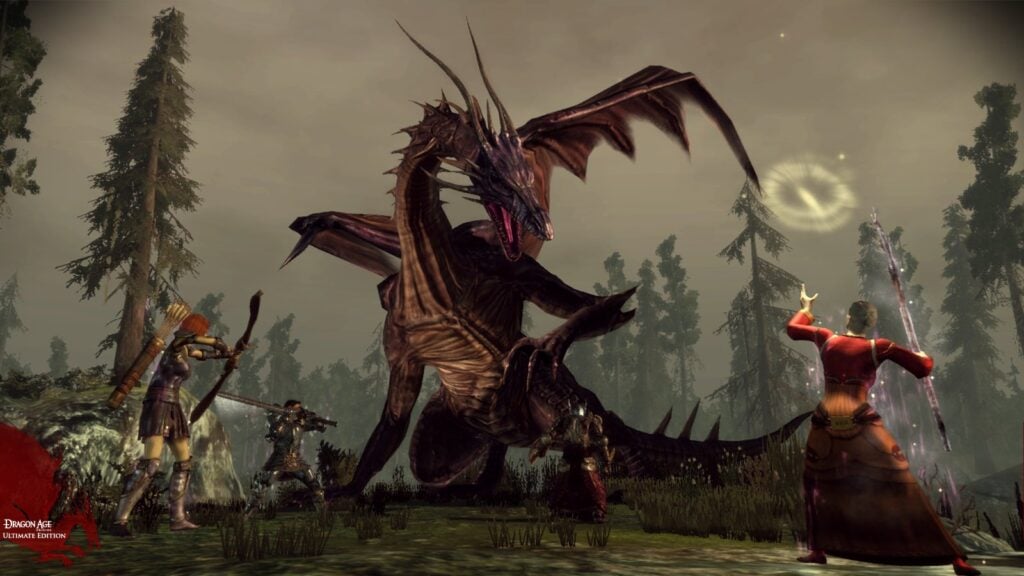
- A grim, grounded world with political intrigue.
Few games make us feel as much like a fantasy tactician as Dragon Age: Origins. Its class-specific skill trees let warriors, mages, and rogues branch out into specializations, like becoming a Blood Mage or a Duelist, with their own signature abilities. Each decision changes the flow of battle. On my first run, playing as a dual-wielding rogue, every skill unlock made me a deadlier assassin. Playing as a mage later, I leaned hard into support and crowd-control spells. The different possible combinations encourage us to try out new approaches, even years after release.
2. Action RPGs
Action RPGs blend visceral combat with satisfying character growth. Here, the thrill of real-time battles meets the depth of customization. Get ready for fast-paced encounters and loot galore!
4. Diablo III

Blasting through dungeons and facing relentless hordes, Diablo III’s skill trees, a hallmark of the best games with a skill tree, are equal parts chaos and strategy. Each class (like the Demon Hunter or Wizard) has wildly different skill sets, and the beauty is in tweaking runes and abilities to fine-tune your own flavor of destruction. We’ve spent hours mixing and matching, finding new builds; one season we were all about Firebats Witch Doctor, the next it was a freezing Wizard raining down Frost Novas. There’s just so much room for experimentation, and every new item or patch nudges us towards yet another creative build.
5. Cyberpunk 2077

- Soaked in neon, corruption, and tech.
Entering the neon-soaked streets of Night City, every skill tree in Cyberpunk feels like a futuristic puzzle. Do we max out Quickhacks, hacking into cameras, and controlling the battlefield invisibly? Or go full tank, using the “Body” branch for brute strength and resilience? The “Cool” tree is always a favorite; it steers us toward stealth and critical hits for that cinematic assassin vibe. One memorable run, we built V as a cyber-ninja, blinking into rooms and taking out enemies before they even raised an alarm. The flexibility encourages us to play our own story every time.
6. Path of Exile

- Crafting system that lets you brick or bless an item with a single click.
Talk about intimidating! Path of Exile’s passive skill tree, a prime example of the best games with a skill tree, is like a galaxy unto itself, with thousands of possible routes. At first, that sea of nodes is overwhelming, but soon, it becomes a playground for creativity. Want a speedy bow-wielder? A tanky spell specialist? Something totally bonkers? The tree allows it, and we often find ourselves mapping out elaborate builds before we even start our game. Every league, every fresh start, is a new adventure in experimentation and theorycrafting.
3. Stealth/Action Games
In the shadows and amidst the fray, Stealth/Action games offer a unique dance of tension and execution. Mastering the art of surprise or engaging in fluid combat is key to survival. Let’s explore some titles that embody this blend.
7. Assassin’s Creed Valhalla

Nothing quite matches the thrill of unlocking new ways to explore, fight, and sneak in Valhalla. The skill tree is a sprawling map of Norse knowledge; one path amplifies stealth, another turns us into an axe-wielding warrior, or maybe we focus on exploration perks for looting. The first time we gained the advanced assassination skill, suddenly every fortress break-in felt like a legendary heist. These paths are all interconnected, meaning every Eivor we build is unique.
8. Shadow of Mordor / Shadow of War
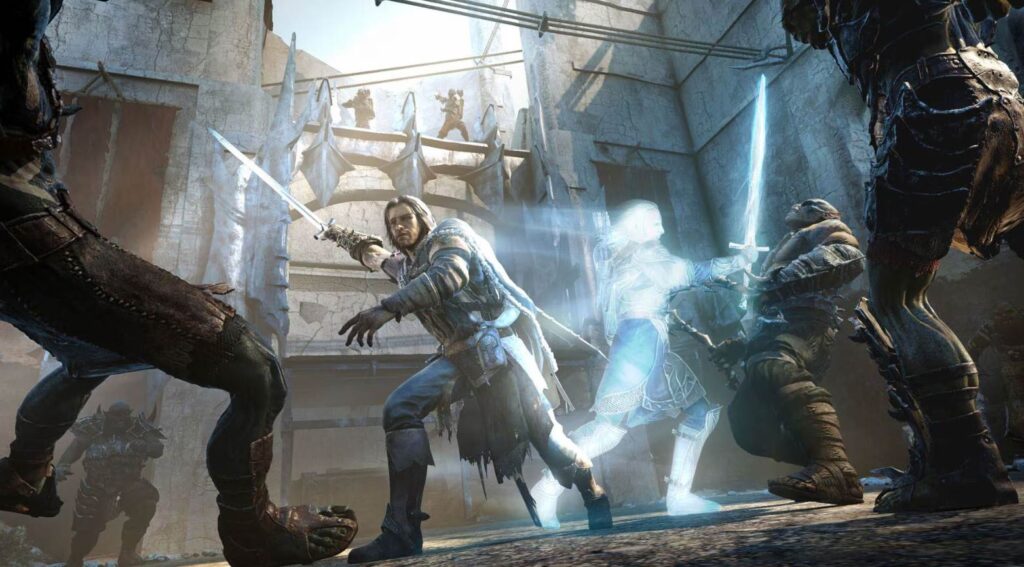
- Slick combat inspired by the Arkham series.
Lord of the Rings fans know that these games let us play with power. Each new ability (like “Dominate” or chain-shooting arrows) changes the way we interact with Sauron’s armies. We had a blast experimenting: stealth sniping captains in one chapter, then switching to full-on orc domination the next. The skill system isn’t just about getting stronger; it’s about how you conquer Mordor.
4. Survival and Crafting Games
The elements become your tools in survival and crafting games, demanding resourcefulness and adaptation. Facing the wilderness and building your haven are constant challenges. Let’s delve into a world where survival meets technological wonder.
9. Horizon Zero Dawn / Horizon Forbidden West

- Post-apocalyptic Earth reclaimed by nature.
Horizon’s skill trees, often cited among the best games with a skill tree, might be some of the most rewarding in an open-world game. Early on, you’ll want to choose between stacking up on hunter skills, doubling down on resource gathering, or expanding your trap-laying arsenal. It’s a real feeling of growth seeing Aloy go from novice to master, especially as you unlock new traversal moves and stunning machine overrides. When we focused on stealth, we found ourselves weaving through tall grass for silent takedowns; even replaying sections just to see how different upgrades would change our approach.
10. The Forest
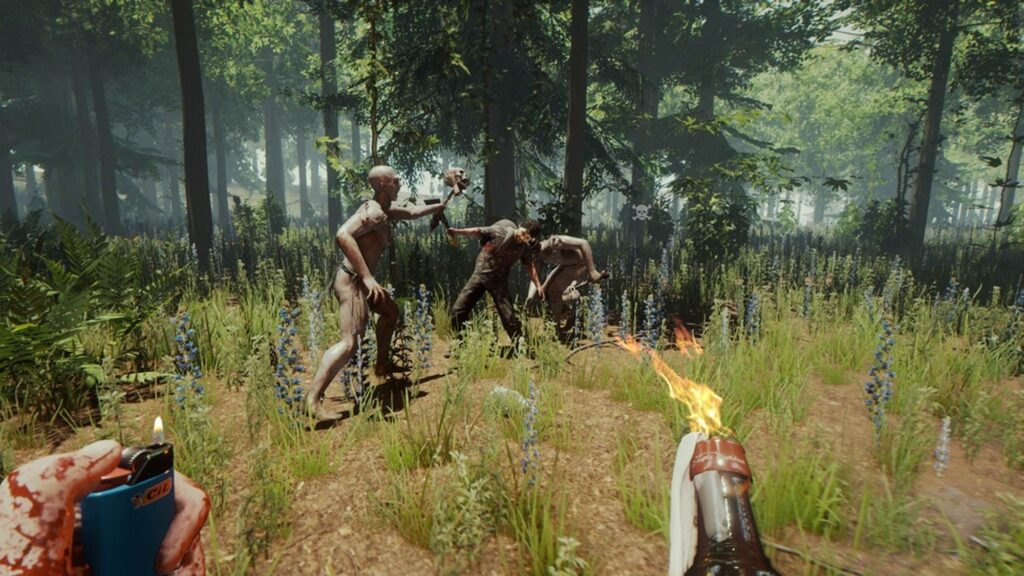
- Craft, build, hunt, and gather resources.
Out in the wild, the crafting and survival skill tree in The Forest is a true lifeline. Unlocking better traps, stronger fortifications, and advanced survival tricks never stops feeling satisfying, especially when dusk falls and you hear something rustling in the trees. Each new ability can mean the difference between making it through the night or running for your life!
5. Shooters and FPS Games
Get ready for adrenaline-pumping action and a barrage of firepower in shooters and FPS games. Let’s lock and load into some explosive titles.
11. Borderlands Series

Talk about mayhem! Every Vault Hunter in Borderlands has multiple skill trees, and each is dripping with personality. Amara (in Borderlands 3) could be a phaselocking brawler or a distance fighter, or, why not, something in between. Tweaking builds was half the fun during our co-op sessions; we were always eager to hear, “Wait, what new build are you running this time?”
12. Far Cry 5

- Open-world first-person shooter with tons of exploration.
For those craving flexibility, Far Cry 5 blends skill trees, a common feature in the best games with a skill tree for weapons, takedowns, stealth, and survival. After testing out a bunch of different paths, sniper ghost, gun-toting maniac, or stealthy predator, we realized you really can play your own way and flip strategies on the fly.
Honorable Mentions
Some games may not be as skill-tree heavy, but they still deserve recognition for the unique flavor they bring.
13. Dark Souls III
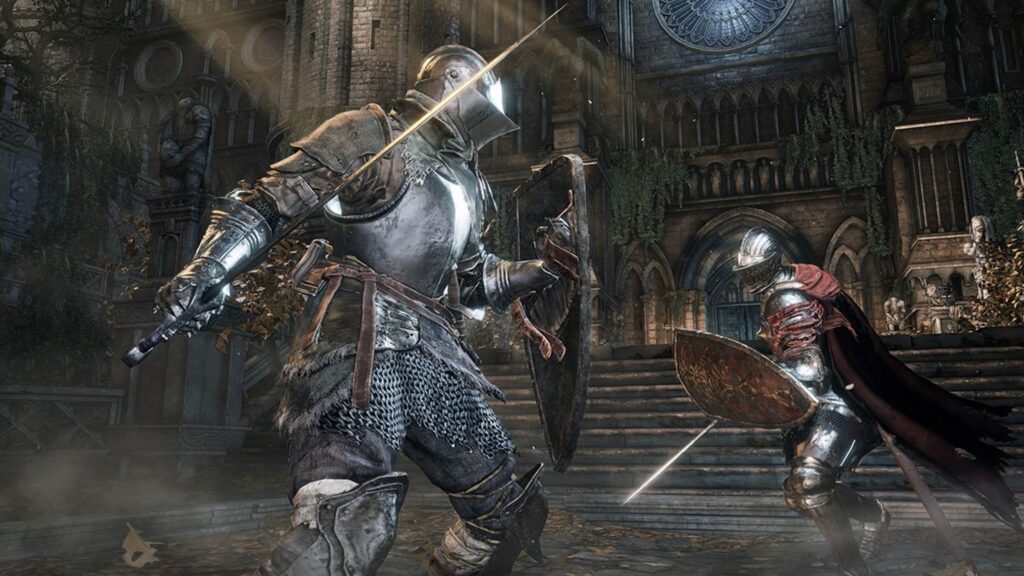
- You play as the Ashen One, an Undead.
Attribute points and minimal skill trees, sure, but the way stats dictate playstyle is pure magic. Will you master parrying as a quick Dex build, or bulldoze foes with a tanky strength knight?
14. Sekiro: Shadows Die Twice
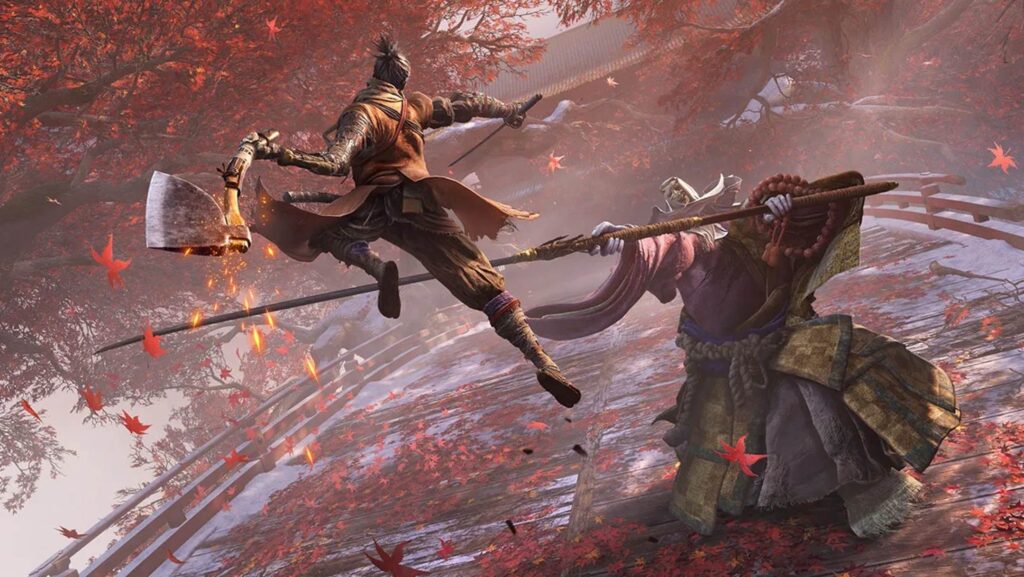
- Stealth elements play a major role.
Simplicity in structure doesn’t mean simplicity in combat; Sekiro’s skill trees allow us to gradually unlock new sword techniques, prosthetic tools, and all sorts of acrobatic maneuvers.
15. The Outer Worlds

- Open-world structure, allowing exploration.
Looking for a sci-fi twist? The Outer Worlds blends perks and skills in ways that make each spacefaring hero unique. We especially enjoyed stacking dialogue perks to become the galaxy’s smoothest talker.
Why Skill Trees Enhance Replayability
Skill trees breathe endless life into great games, especially the best games with a skill tree. Have you ever finished a story, only to start again because you want to try a totally different playstyle? We’ve done it countless times. For example, in Cyberpunk 2077, going from a quiet netrunner to a brawler with gorilla arms turned the whole vibe upside-down. With games like Horizon Zero Dawn or Borderlands, you’re always itching to discover how new abilities unlock secret paths, alternate story moments, or even hidden boss strategies. Skill trees are the heartbeat of replayability; they beg us to try “just one more build.”
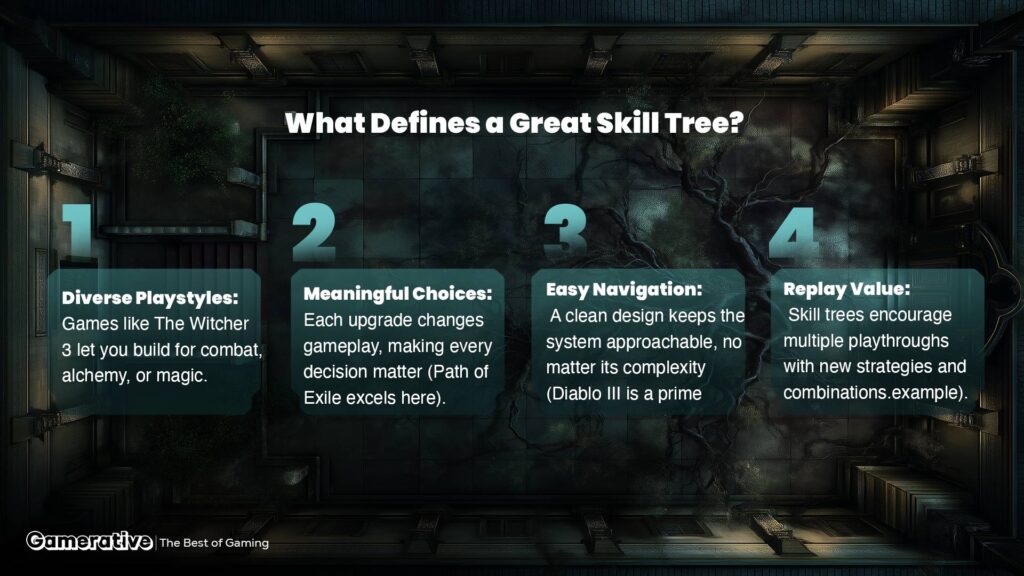
The Evolution of Skill Trees in Modern Games
Skill trees have come a long way from linear upgrade paths. Once, progression was straightforward; a perk here, an ability there. Now? Games like Path of Exile unleash sprawling, interconnected webs, daring us to forge our own identities. Modern trees also weave story into progression: as you unlock powers in Shadow of Mordor, you’re gaining new story options, not just new moves. We’re seeing more adaptive, responsive skill systems, and we’re excited to see where this innovation goes. Upcoming RPGs are hinting at skill trees that shift dynamically with in-game choices; a future that seems full of even deeper personal agency and creative experimentation.
Summing Up
Skill trees are the ultimate sandbox for personalization, letting us tell our own stories and test our wildest strategies. They’re why the best RPGs or shooters become classics: offering complexity for veterans and experimentation for newcomers. The best games with a skill tree are as much about playstyle discovery as they are about progression; every run is a fresh journey. So, what are your favorite games with skill trees? Have a legendary build you swear by, or a story of a wild, failed experiment you still remember? Share your thoughts in the comments or on social media; we’re always looking to trade stories and swap build ideas. Here’s to many more adventures, abilities, and the perfect skill tree run!
Read the latest and the best of gaming lists via Gamerative.
Frequently Asked Questions About Skill Trees in Games
Q1: Do any games let you reset your skill tree if you make a mistake?
Absolutely. Many modern games like Borderlands 3, Cyberpunk 2077, and The Witcher 3 allow you to respec or reassign skill points, sometimes for in-game currency, so you can experiment without fear.
Q2: Is it better to specialize in one skill tree branch or spread points around?
It often depends on your playstyle and the game’s balance. Usually, focusing on one branch unlocks the most powerful abilities sooner, but spreading points early can help you survive tough moments by gaining versatility.
Q3: Are there skill trees that unlock unique quests or story moments?
Yes! Some games, like The Outer Worlds and parts of Assassin’s Creed Valhalla, feature skills or dialogue perks that branch into new quest paths or solutions, making your choices feel especially meaningful.
Q4: How do you choose a starting path in a complex skill tree?
We recommend thinking about the gameplay you enjoy most (stealth, direct combat, crafting, etc.) and picking skills that enhance that experience first. Don’t be afraid to look up community builds or guides if you feel overwhelmed, and remember: experimenting is half the fun!




